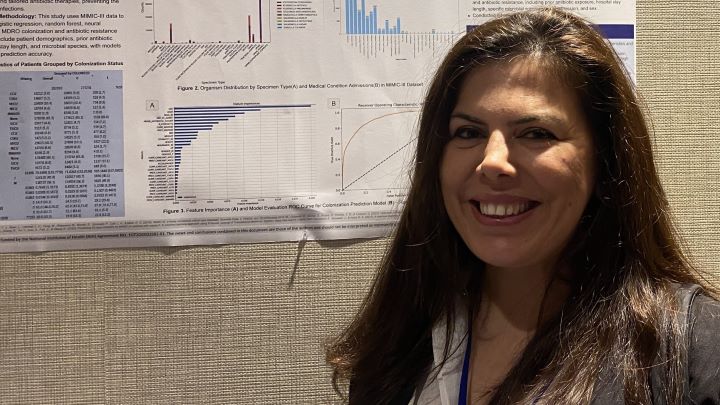Dr. Devrim Kaya shares insight about impactful experience following her receipt of NIH Aim-Ahead Fellowship

Dr. Devrim Kaya is an Assistant Professor who has worked at SDSU for the past year. Dr. Kaya was selected for the NIH Aim-Ahead Fellowship and expressed how it has been a “transformative experience, offering a rich blend of training, mentorship, and collaboration.”
Dr. Kaya was selected for two fellowships: the AIM-AHEAD Leadership Fellowship and the AIM-AHEAD and NCATS Fellowship Program. The AIM-AHEAD Leadership Fellowship focused on addressing health disparities by learning leadership skills with Artificial Intelligence/Machine Learning (AI/ML). It included workshops, connection with a variety of communities and professionals, and team projects with AI/ML that worked towards improving health disparities. The AIM-AHEAD and NCATS Fellowship included learning about electronic health records(EHR) and AI/ML have to offer and how to use them.
Dr. Kaya states that the experience was eye-opening training. She said “For the first time in my career, I learned how EHRs can be used to address health inequities, leveraging data from the N3C (National COVID Cohort Collaborative) Data Enclave.” Both of these fellowships included fundamental mentorship and working with mentors has led to improving skills, confidence and becoming a better leader and researcher. Dr. Kaya “particularly appreciated the tailored mentorship and the focus on ethical applications of AI/ML to drive health equity.” The largest takeaway from the fellowships was “ understanding that AI/ML can be a powerful catalyst for addressing health inequities when applied thoughtfully and inclusively” and the emphasis on “the importance of community partnerships and ethical considerations.”
Over the past year Dr. Kaya has co-organized the Ethical Sewer Research Workshop Series supported by the NSF on which she collaborates with the University of Colorado Boulder and the University of Louisville. This initiative explores ethical and sustainable use of wastewater. Dr. Kaya also participated in the organization of the 15th annual CSU-WATER Conference that took place in April and the 2024 SDSU Water Day Event. These events “address critical water management challenges.” Dr. Kaya has thoroughly enjoyed being a part of SDSU and expressed that “while navigating a new academic environment presented challenges… these experiences motivated me to actively seek out collaborations and build professional networks beyond SDSU.” She has also found mentoring students on projects to be very rewarding.
Dr. Kaya is currently working on leading several projects. She has begun “a study on microbial dynamics and contaminant degradation in the Salton Sea, research on healthcare utilization patterns among PTSD patients, focusing on socioeconomic and environmental disparities, developing the MoBE (Microbiome of the Built Environment) Health Index to assess microbial health in indoor environments and its impact on occupant well-being, [and] exploring antibiotic resistance risks using EHR.” In the future she hopes to expand research in environmental health by investigating the intersection of microbial ecology and human health. Dr. Kaya also wants to pursue studies researching the health outcomes and impacts in microbial communities from agricultural runoff. She aims to develop research to address environmental justice and public health disparities and integrate AI/ML into projects.
Dr. Kaya would like to express how the FUERTE Program positively impacted her professional development. She is “especially grateful for the opportunities provided by the NIH, through the AIM-AHEAD and NCATS fellowships, which have been instrumental in advancing my career.” It has led to growth as a researcher and mentee. She values the investment that the NIH and SDSU has made in working towards growing the underrepresented research community and advancing health equity. Dr. Kaya looks forward to being a mentor for the next generation and to contributing to new and impactful research.

